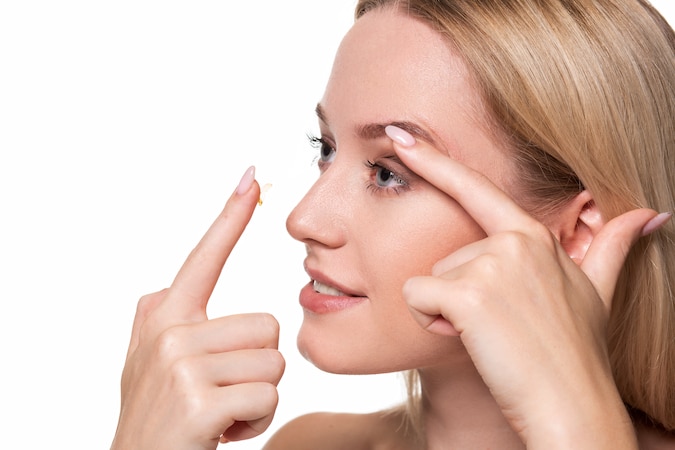
Protecting Your Vision: Essential Tips for Lifelong Eye Health

Your vision is a vital part of your health, yet it’s easy to overlook habits that can damage your eyes over time. From wearing cosmetic contacts to rubbing tired eyes, small actions can lead to significant issues.
In this guide, we’ll shareproven eye care prevention tipsto help you protect your sight, avoid eye injuries, and maintain overall health.
Key Takeaways:
- Never sleep in contact lenses, even for naps.
- Manage blood pressure and blood sugar to avoid eye complications.
- Use protective eyewear when working with high-velocity machines.
- Avoid rubbing your eyes to prevent infections or damage.
Avoid Sleeping in Contact Lenses

Sleeping in contact lenses—even for short periods—poses serious risks to your eye health. Contacts block oxygen from reaching your corneas, which can lead to infections and corneal ulcers.
Key risks include:
- Infections:Bacterial or fungal infections like keratitis.
- Corneal Hypoxia:Reduced oxygen leading to swelling and irritation.
- Permanent Vision Loss:Severe infections may cause irreversible damage.
Best Practice:Always remove contacts before sleeping, cleaning them properly with solution. If you struggle to remember, set a phone reminder or opt for daily disposable lenses.
To learn more about comprehensive wellness solutions, visit SelfGood for expert health resources.
Say No to Cosmetic or Non-Prescription Contacts
Cosmetic contacts—often sold without a prescription—are popular for fashion purposes, especially during Halloween or events. However, these contacts can harm your eyes:
- Poor Fit:Non-prescription lenses may scratch or irritate the cornea.
- Infections:Without proper sterilization, they can introduce harmful bacteria.
- Vision Damage:Long-term use can impair vision or cause scarring.
Always purchase contact lenses from licensed eye professionals and follow care instructions strictly. If you want colored lenses, consult your eye doctor for safe options.
Control Your Blood Pressure and Blood Sugar
Chronic conditions like diabetes and hypertension can directly impact your eye health. Elevated blood pressure and blood sugar can damage delicate blood vessels in the eyes, leading to conditions like:
- Diabetic Retinopathy:Swelling and leaking of retinal blood vessels.
- Hypertensive Retinopathy:Narrowing of arteries leading to vision changes.
- Glaucoma and Cataracts:High blood sugar accelerates these conditions.
Prevention Tips:
- Monitor your blood pressure regularly.
- Follow a balanced diet low in sodium and sugar.
- Stay active to improve circulation and manage weight.
- Schedule routine eye exams, especially if you have diabetes or hypertension.
For more insights on managing health effectively, check out our health tips blog to stay informed and proactive.
Wear Protective Eyewear at Work or During Hobbies
Eye injuries are common when working with metal, woodworking tools, or engaging in sports. High-velocity tools and sharp debris pose significant risks:
- Foreign Objects:Dust, metal shavings, and chemicals can scratch or damage your eyes.
- Blunt Trauma:Impacts during sports like basketball can lead to retinal detachment.
- UV Exposure:Outdoor activities without sunglasses increase risks of cataracts.
Protective Measures:
- Wear ANSI-rated safety goggles for work involving tools or chemicals.
- Use sport-specific protective eyewear during physical activities.
- Choose sunglasses with UV protection when outdoors.
Avoid Rubbing Your Eyes
Rubbing your eyes may feel soothing but can cause more harm than good. Frequent rubbing:
- Spreads Bacteria:Introduces germs that cause infections like conjunctivitis.
- Increases Allergies:Releases histamines, worsening itchiness.
- Damages Corneas:Vigorous rubbing may thin the cornea or cause keratoconus.
Instead, use lubricating eye drops for dry eyes or cold compresses to reduce irritation. If itching persists, consult an eye care professional.
Prioritize Regular Eye Exams
Routine eye exams can detect early signs of conditions like glaucoma, cataracts, or diabetic eye disease. Adults should schedule examsevery 1-2 years, while seniors or those with chronic conditions may need annual checkups.
Why Eye Exams Matter:
- Early detection prevents permanent vision loss.
- Your prescription can be updated for optimal clarity.
- Eye health often reflects overall health concerns.
For state-specific health insurance options to cover your eye care, explore health insurance plans and ensure your family’s health is protected.
By following these eye care prevention tips, you can preserve your vision for years to come. Remember, small changes—like removing contacts before bed and wearing protective eyewear—go a long way in maintaining lifelong eye health.




